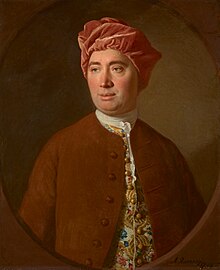Homo economicus
concept in many economic theories of humans as rational and narrowly self-interested actors who have the ability to make judgments toward their subjectively defined ends
Homo economicus, or economic man, is the concept in many economic theories portraying humans as consistently rational and narrowly self-interested.

Quotes
edit- Some political scientists, for example, say that the Economic Man may be very nice for playing games with but that he is an abstraction who does not exist, while Hitler and Stalin are real and not to be played with. Economic analysis, they say, not only does not help us to understand such political actors but makes it more difficult to bring them within the purview of social science by systematically excluding or deforming their specific motives. Economists, seeking mathematical convenience, turn us away from the consideration of the most important social phenomena.
- Allan Bloom, The Closing of the American Mind (1988), p. 361
- [T]he entrepreneur is the focal point at which the dynamic forces... materialize into action for economic progress. The entrepreneur doesn't really respond primarily to the profit motive... entrepreneur and investor—are often not... the same person. Neither does the entrepreneur seek power... management and entrepreneur are not necessarily one. Nor do Veblenesque social status or Weberian Protestant righteousness seem to be the main motives... Rather, he seems to be the adventurer, a pioneer, an artist sculpting in economic clay. ...Is the dynamic force that sustains the industrialized economic system... an irrational spirit..? Many economists... postulate the existence of an "economic man," who rationally and objectively computes... and makes a decision that will maximize perofits. ...[T]his imaginary construct is the dynamic implicitly assumed for almost all of the economic theories from the late 1800s to the present. ...[T]hey continue to use it because without economic man most of their theories would be invalidated.
- Martin Gerhard Giesbrecht, The Evolution of Economic Society: An Introduction to Economics (1972) Ch. 7, The Arrival of Modern Economies and Economics, pp. 190-191.
- There is a principle, supposed to prevail among many, which is utterly incompatible with all virtue or moral sentiment; and as it can proceed from nothing but the most depraved disposition, so in its turn it tends still further to encourage that depravity. This principle is, that all benevolence is mere hypocrisy, friendship a cheat, public spirit a farce, fidelity a snare to procure trust and confidence; and that while all of us, at bottom, pursue only our private interest, we wear these fair disguises, in order to put others off their guard, and expose them the more to our wiles and machinations.
- David Hume, An Enquiry Concerning the Principles of Morals (1751), Appendix 2
- Political economy ... does not treat the whole of man’s nature as modified by the social state, nor of the whole conduct of man in society. It is concerned with him solely as a being who desires to possess wealth, and who is capable of judging the comparative efficacy of means for obtaining that end.
- John Stuart Mill, "On the Definition of Political Economy, and on the Method of Investigation Proper to It," London and Westminster Review, October 1836.
- Both Socrates and Christ taught economic man to be at least slightly ashamed of himself when he failed to sacrifice the lower capacity to the higher. Freud is America’s great teacher, despite his ardent wish to avoid that fate. For it was precisely the official and parental shams of high ideals that Freud questioned. In their stead, Freud taught lessons which Americans, prepared by their own national experience, learn easily: survive, resign yourself to living within your moral means, suffer no gratuitous failures in a futile search for ethical heights that no longer exist—if they ever did.
- Philip Rieff, The Triumph of the Therapeutic (1966), chapter 2
- The average man of the present age … does not want to be a sentimentalist in his endeavors; he wants some measure for purposeful activity; he wants to feel that through the world some increasing purpose runs. … But since his metaphysic calls only for magnitude and number, since it is becoming without a goal, it is not a source of distinctions in value. It is a system of quantitative comparison. Its effect therefore has been to collapse the traditional hierarchy and to produce economic man, whose destiny is mere activity.
- Richard Weaver, Ideas Have Consequences (Chicago: 1948), p. 51